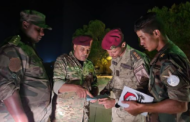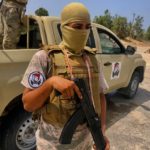In Braak Shaati, a group of Russian Wagner Group mercenaries arriving from Jufra reportedly entered a local security base. Clashed ensued and explosions were heard.
In Brega-Hariga, Libya’s state National Oil Corporation (NOC) confirmed operations resumption at the local oil ports. Likewise, force-majeure status was lifted from the the Zueitina oilfield.
In Sebha, one of Daesh ringleaders in North Africa, Abu Abdullah al-Libi, was killed by the LNA.
In Sokna, a helicopter reportedly carrying Russian mercenaries of the Wagner company crashed near the Jufra base. Four were reported dead, though the LNA denied any casualties and retorted the helicopter had made an emergency landing due to a technical fault.
In Tajura, the two militias “Osoud Tajoura” and “Al-Dhaman” were dissolved by order of the Ministry of Defence.
In Tripoli, unrest continues due to protest over the kidnapping and killing of a middle-aged women and the unceasing blackouts paralyzing the city.
At the International level, Russia and China blocked the official release of a UN report accusing Libyan warring parties and their international backers of violating UN arms embargo on Libya.
US Secretary of State, Mike Pompeo, confirmed the US targeted a network linked to the owner of the Wagner mercenary group and close associate of President Vladimir Putin.
The European Union has lifted sanctions against the former General National Congress (GNC) President, Nuri Abu Sahmain
BENGHAZI
- the organizers of “Saving Libya from Corruption and the Corrupt” Movement said activist Rabie al-Arabi was kidnapped after taking part in September 21 protests in Benghazi. Libya Al-Ahrar TV Channel reported sources from Benghazi as saying that Al-Arabi had been out of reach since he took to the streets in the city taking part in the protests that were attacked by pro-Haftar groups.

BRAK SHAATI
- sources from Brak Shaati in southern Libya told Libya Al-Ahrar TV Channel on September 26 that explosions had been heard at the military base. The sources added that a group of Russian Wagner Group mercenaries came from Jufra and entered Brak Shaati base, saying they had been working on securing the base. The sources believed Wagner mercenaries had been making trials on different weapons inside Brak Shaati base as they continued to expand their presence from Jufra airbase toward the south, especially Sharara oilfield, Brak Shaati base and Temnehent airbase.
BREGA – HARIGA OIL PORTS
- Libya’s state National Oil Corporation (NOC) on September 21 confirmed the resumption of operations at its ‘‘safe’’ Hariga and Brega oil ports. This comes after the ‘‘agreement’’ between Libya National Army (LNA) commander, Khalifa Haftar, and (Fayez al-Sarraj’s) Presidency Council Deputy, Ahmed Maetig, to resume oil production and exports.
GHARYAN
- residents in the city of Gharyan held a protest on September 23, demanding municipal council elections in the city. The protesters raised banners calling for a peaceful transmission of power, chanting “the current municipal council is expired,” according to images circulated on social platforms.
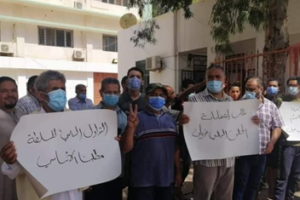
SEBHA
- a spokesperson for the Libyan National Army (LNA), Ahmad al-Mismari, said on September 23 that the LNA has eliminated one of the ringleaders of the Daesh terrorist group in North Africa, known as Abu Abdullah al-Libi. Al-Mismari said that on 15 September, the LNA announced that it had killed nine Daesh militants during an operation in the south-western part of Libya.
SOKNA
- Russia’s Wagner Group mercenaries suffered on September 23 a helicopter crash on Sokna road near Sebha. Four mercenaries were killed in the helicopter incident, which was followed by a US Secretary of State’s statement that said Washington had targeted a Russian network linked to the owner of Wagner Group that is doing malign activities in Libya and beyond;
- the LNA said on September 23 no casualties arose from the crash, claiming the helicopter landed due to a technical fault while on a reconnaissance mission. A military sources close to the GNA said that the helicopter was transporting the mercenaries as part of a redistribution of Wagner fighters away from oil production areas towards the strategic area of Jufra;
- the spokesman for the Libyan Government of National Accord’s Sirte-Jufra Operations Room Abdelhadi Drah said that a helicopter carrying Russian fighters crashed in western Sokna, near Jufra airbase. A source from Sokna told The Libya Observer on September 23 that the helicopter was carrying Wagner Group mercenaries and ammunition, saying its crashing accident caused explosions for several hours. The source added that multinational forces under Wagner Group rushed to the accident scene and closed all roads leading to it, preventing civilians and military forces from approaching the wreckage. Haftar’s forces have been deploying fighters and military equipment as well as Pantsir-S1 systems in many areas in the region.
TAJOURA
- the Minister of Defence, Salah al-Namroush, has ordered the dissolution of two battalions of Tajoura forces over the clashes that erupted late September 24 night and September 25 morning in the district of Tajoura, east of the capital. Al-Namroush gave instructions to refer the commanders of both factions to the Military Prosecutor General for investigation and permitted the use of force against the two battalions, namely the “Osoud Tajoura” and the “Al-Dhaman” if they refuse orders to cease hostilities;
- two militias recognized by the internationally recognized Libyan government in Tripoli clashed on the borders of the eastern Tripoli suburb of Tajoura (Bivi/Bir Stamilad) between September 24 night and September 25 morning. The militias, Al-Dhaman (Security) and Osoud Tajoura (Tajoura Lions), engaged in heavy gunfire across residential areas, residents reported.
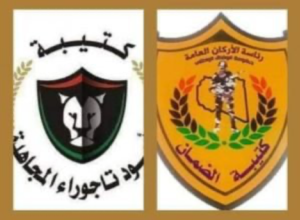
TARHUNA
- on September 26, a number of Tarhuna citizens held demonstrations calling on the Government of National Accord (GNA), along with the international community to reveal the fate of their missing and/or kidnapped relatives and loved ones at the hands of the Al-Kani militias, loyal to Khalifa Haftar.
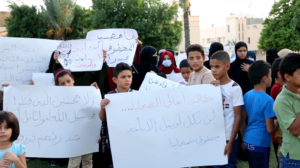
TRIPOLI
- the confirmation of the kidnapping and murder by the Tripoli Interior Ministry on September 24 of a middle-aged woman in Tripoli has sent shock waves of insecurity amongst residents of the capital. The woman, Fathia al-Lafi, was reportedly forced out of her grey Kia car and abducted on 17 September. Despite a social media campaign to locate her, on September 23 her body was discovered in south Tripoli. The reasons for her abduction and murder are still unclear;
- there were more road closures, mostly by youth, using burning tyres reported in Sug Juma, Tripoli and in Zliten – in protest at the continued and lengthy power cuts across Libya. Some areas have had over 20 hours without electricity.
ZUEITINA OIL FIELD
- Libya’s state National Oil Corporation (NOC) announced on September 22 that it has lifted force majeure on Zueitina oilfields and port. It said that it has over the past two days assessed the security at Zueitina oilfields and port which it reported showed a significant improvement in the security situation that allowed it to resume production and exports to world markets. Accordingly, it says the operator of Zueitina has been instructed to initiate production arrangements.
INTERNATIONAL RELATIONS
- the UN Support Mission in Libya (UNSMIL) has expressed concern on September 25 over clashes that erupted on September 24, between two armed groups in the eastern suburb of Tripoli, Tajoura. The UN called for the immediate cessation of hostilities;
- the UN acting envoy to Libya Stephanie Williams has recommended sanctions for anyone trying to spoil next month’s crucial Libyan talks aimed at negotiating a unity government. Williams told Bloomberg that the dysfunction has become so severe that there is an urgent need for change;
- Russia and China blocked the official release of a report by UN experts on Libya that accused Libyan warring parties and their international backers – including Russia – of violating the UN arms embargo on Libya. Germany’s deputy UN ambassador, Gunter Sautter, said he brought the issue to the Security Council after the two countries blocked the report’s release by the committee monitoring sanctions on Libya, which Germany heads;
- the Algerian Newspaper Al-Hiwar, on September 25, reported that a number of African countries had refused to accept the naming of Bulgarian diplomat Nickolay Mladenov as the new United Nations (UN) envoy to Libya. The newspaper quoted an African diplomat at the UN as saying “it is nothing personal, however we require an African diplomat to assume this position”. Earlier, the UN Secretary-General, Antonio Guterres, suggested the appointment of former Ghanaian Foreign Minister, Hanna Tita, but the United States reportedly rejected the nomination
- UNSMIL reported on September 25 that on 23 September, Acting UN SRSG Stephanie Williams and the Ambassador-designate of the European Union to Libya, José Sabadell, as the rotating chair of the Economic Working Group (EWG) established by the Berlin Process, convened a meeting with the new leadership of the General Electricity Company of Libya (GECOL) to discuss plans to address the unacceptable electricity crisis;
- the Egyptian President Abdel Fattah al-Sisi held a meeting on September 23 with Khalifa Haftar and Speaker of the Libyan House of Representatives Aqila Saleh in Cairo in the presence of Intelligence Chief Abbas Kamel. The Egyptian Presidency said the meeting discussed latest developments in Libya and efforts to consolidate the ceasefire and push forward the UN-led peace process;
- the Russian Foreign Minister, Sergey Lavrov, confirmed that dialogue and consultations, which took place some days ago between the Russians and Turks in Ankara, were aimed at assisting the Libyan parties to consolidate the ceasefire. Lavrov stressed in a televised statement on September 23, the need to reach an agreement between the Libyans themselves, saying that Russia and Turkey could use their good influence to persuade the parties to consolidate the situation on the ground;
- the United States Secretary of State, Mike Pompeo, confirmed on September 23 that his country had targeted a network linked to the Russian operative, Yevgeny Prigozhin, owner of the Wagner mercenary group and close associate of President Vladimir Putin. Pompeo said in a tweet that this network is “working to advance Russia’s malign influence in the Central African Republic, Libya, and beyond”;
- Kazakhstan has interrupted the work of three airlines for violating the arms embargo imposed on Libya. The Kazakhstani government stated on September 23 that the airplanes of the three companies, which organized flights to Libya from a ‘third party’ country, are foreign-owned;
- Jordan has denied any links with a firm the European Union listed as violating the arms embargo on Libya. The spokesman for Jordan’s Foreign Ministry Daifallah al-Fayez said on September 22 Med Wave company isn’t Jordanian nor is it registered or based in Jordan;
- the German Ambassador to Libya, Oliver Owcza, presented several proposals to rid Libya of the electricity crisis which the country has been suffering for years and which, lately has worsened drastically. This came during a visit by the ambassador on September 22 to the headquarters of the General Electricity Company of Libya (GECOL), in coordination with the Ministry of Foreign Affairs and the Department of Cooperation in European Affairs;
- the UN Secretary-General, Antonio Guterres, warned that risks of renewed confrontation in Libya are intensifying, noting his disturbance of the massive concentration of mercenaries and weapons that violate the Security Council resolutions, as he put it;
- Turkish President, Recep Tayyip Erdogan has called on the United Nations to take a firm stand against the violations committed by Haftar and his militias in Libya, which “undermine the Geneva Convention and the international human rights system,” as he put it;
- the Turkish Defense Minister Hulusi Akar held a meeting on September 22 with Libya’s Head of High Council of State Khalid al-Mishri, saying Turkey will continue to stand by the Government of National Accord;
- the Turkish President, Recep Tayyip Erdogan said that his country will continue to support the Libyan Government of National Accord (GNA), despite the announcement by Fayez al-Sarraj, of his intention to step down by the end of the coming October, according to the Presidential Spokesman Ibrahim Kalin;
- the European Union has lifted sanctions against the former General National Congress (GNC) President, Nuri Abu Sahmain, currently heading the “Ya Bilady” party and head of the Tobruk-based House of Representatives (HoR), Aqila Saleh. This came at a press conference, by the EU foreign policy chief, Josep Borrell, on September 21, following the meeting of the EU foreign ministers, in which they imposed new sanctions on two Libya nationals and 3 companies;
- the EU on September 21 imposed additional sanctions for human rights abuses and arms embargo violations on two Libyans and three companies from Kazakhstan, Turkey and Jordan. The two Libyans are Mahmoud Werfalli, for human rights violations, and Moussa Diab, for human rights abuses. The three companies are: Sigma Airlines, Kazakhstan; Avrasya Shipping, from Turkey; and Med Wave Shipping, from Jordan – all for UN arms embargo violations;
- the Charge d’Affairs of the Philippine embassy in Libya has expressed his country’s desire to use the expertise of Libya in fighting terrorist groups that include war on ISIS in Sirte so the armed forces of the Philippines can build up their capabilities in combating terrorism.




